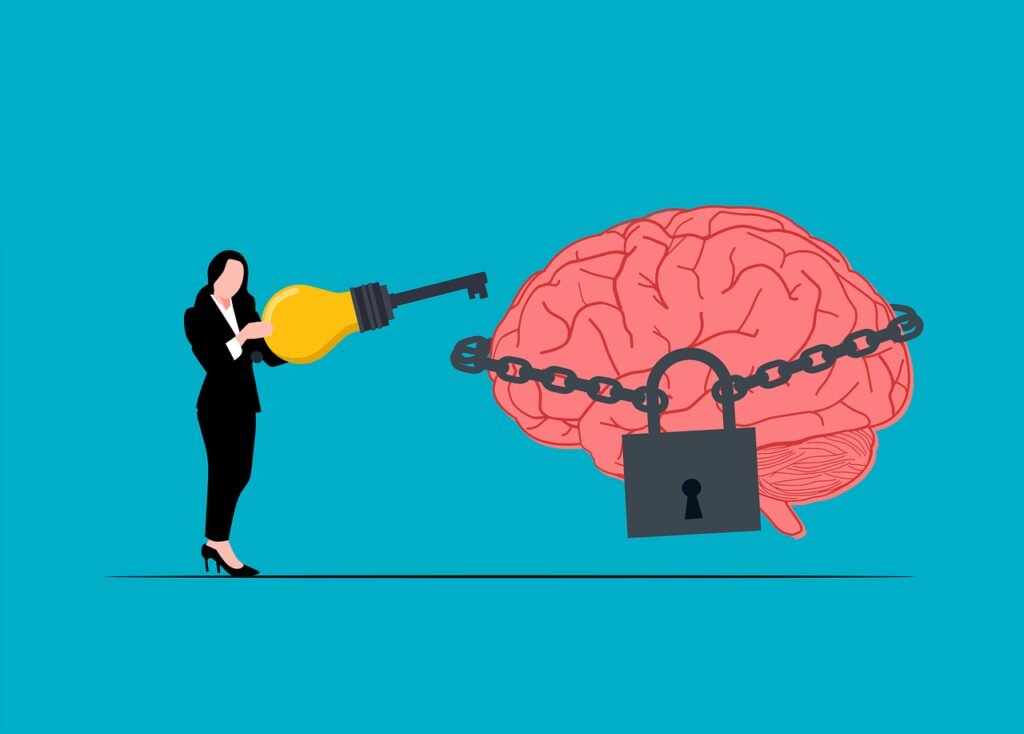
Yoga is far more than a physical exercise; it is a holistic practice that integrates the mind, body, and spirit. This ancient practice has been shown to offer significant benefits for mental health, making it a valuable tool for improving overall well-being. By incorporating specific yoga poses into your routine, you can help reduce stress, alleviate anxiety, and combat depression. These benefits arise from yoga’s ability to promote relaxation, enhance mindfulness, and foster a sense of inner peace.
Table of Contents
Introduction: The Connection Between Yoga and Mental Health
Yoga encourages mindfulness, which is the practice of being fully present in the moment. Mindfulness plays a crucial role in mental health by helping individuals become more aware of their thoughts and feelings without judgment. This increased awareness can lead to better emotional regulation and a more balanced mood. Through regular yoga practice, individuals can cultivate a greater sense of calm and clarity, which can be particularly beneficial for those struggling with mental health issues.
In addition to its mental health benefits, yoga also offers numerous physical advantages, such as improved flexibility, strength, and balance. These physical improvements can further contribute to a sense of well-being, creating a positive feedback loop that enhances mental health. The combination of physical movement, breath control, and meditation in yoga helps to create a harmonious balance between the mind and body, promoting overall health and vitality.
This page will cover 15 yoga poses that can help improve mental health. Each pose has been carefully selected for its ability to promote relaxation, reduce stress, and enhance mindfulness. By incorporating these poses into your daily routine, you can take proactive steps towards better mental health and overall well-being. Whether you are a seasoned yogi or a beginner, these poses can offer valuable benefits for your mental and emotional health.

15 Yoga Poses for Mental Health
Yoga is a powerful tool for improving mental health. Here are 15 poses that can help you achieve a calmer and more focused mind. Each pose includes benefits, steps, and recommended duration.
1. Child’s Pose (Balasana)
Benefits: Calms the mind, relieves stress.
Steps:
- Kneel on the floor with your big toes touching and sit back on your heels.
- Spread your knees as wide as your mat and lay your torso between your thighs.
- Rest your forehead on the mat and stretch your arms forward.
Duration: Hold for 1-3 minutes.
2. Cat-Cow Pose (Marjaryasana-Bitilasana)
Benefits: Improves flexibility, reduces anxiety.
Steps:
- Start on all fours with wrists under shoulders and knees under hips.
- Inhale, arch your back, and look up (Cow Pose).
- Exhale, round your spine, and tuck your chin (Cat Pose).
Duration: Repeat for 1-2 minutes.
3. Downward-Facing Dog (Adho Mukha Svanasana)
Benefits: Energizes the body, reduces stress.
Steps:
- Start on all fours, tuck your toes, and lift your hips up and back.
- Form an inverted V-shape with your body.
- Press your heels toward the mat and keep your head between your arms.
Duration: Hold for 1-2 minutes.
4. Warrior II (Virabhadrasana II)
Benefits: Builds focus, improves balance.
Steps:
- Stand with feet wide apart and turn your right foot out 90 degrees.
- Bend your right knee and extend your arms parallel to the ground.
- Gaze over your right hand.
Duration: Hold for 1 minute on each side.
5. Tree Pose (Vrksasana)
Benefits: Enhances concentration, reduces anxiety.
Steps:
- Stand tall, shift weight to one leg, and place the sole of the other foot on the inner thigh or calf.
- Bring your hands to prayer position at your chest.
- Find a focal point to maintain balance.
Duration: Hold for 1 minute on each side.
6. Bridge Pose (Setu Bandhasana)
Benefits: Relieves tension, calms the mind.
Steps:
- Lie on your back with knees bent and feet flat on the floor.
- Lift your hips towards the ceiling, keeping your shoulders grounded.
- Clasp your hands under your back.
Duration: Hold for 1-2 minutes.
7. Seated Forward Bend (Paschimottanasana)
Benefits: Reduces anxiety, stretches the spine.
Steps:
- Sit with legs straight in front of you.
- Inhale, lengthen your spine, and exhale, fold forward from the hips.
- Reach for your feet or shins.
Duration: Hold for 1-2 minutes.
8. Legs-Up-The-Wall Pose (Viparita Karani)
Benefits: Relieves stress, improves circulation.
Steps:
- Lie on your back and extend your legs up the wall.
- Keep your hips close to the wall and relax your arms by your sides.
Duration: Hold for 5-10 minutes.
9. Corpse Pose (Savasana)
Benefits: Promotes relaxation, reduces stress.
Steps:
- Lie flat on your back with arms by your sides, palms facing up.
- Close your eyes and focus on your breath.
Duration: Hold for 5-10 minutes.
10. Cobra Pose (Bhujangasana)
Benefits: Enhances mood, reduces fatigue.
Steps:
- Lie on your stomach with hands under shoulders.
- Inhale, lift your chest off the ground while keeping elbows slightly bent.
- Look forward or slightly up.
Duration: Hold for 30 seconds to 1 minute.
11. Garland Pose (Malasana)
Benefits: Improves focus, reduces anxiety.
Steps:
- Stand with feet wider than hip-width apart, toes pointing out.
- Bend your knees and lower your hips into a squat.
- Bring your hands to prayer position at your chest.
Duration: Hold for 1-2 minutes.
12. Plank Pose (Phalakasana)
Benefits: Builds strength, enhances focus.
Steps:
- Start in a push-up position with hands under shoulders.
- Keep your body in a straight line from head to heels.
- Engage your core and hold the position.
Duration: Hold for 30 seconds to 1 minute.
13. Half Lord of the Fishes Pose (Ardha Matsyendrasana)
Benefits: Improves digestion, reduces stress.
Steps:
- Sit with legs extended, bend your right knee, and place your right foot outside your left thigh.
- Twist your torso to the right, placing your left elbow outside your right knee.
Duration: Hold for 1 minute on each side.
14. Happy Baby Pose (Ananda Balasana)
Benefits: Reduces stress, improves flexibility.
Steps:
- Lie on your back and bend your knees towards your chest.
- Grab the outer edges of your feet with your hands.
- Gently rock side to side.
Duration: Hold for 1-2 minutes.
15. Reclining Bound Angle Pose (Supta Baddha Konasana)
Benefits: Promotes relaxation, reduces anxiety.
Steps:
- Lie on your back and bring the soles of your feet together.
- Let your knees fall open to the sides.
- Place your arms by your sides with palms facing up.
Duration: Hold for 5-10 minutes.
How to Incorporate These Poses Into Your Daily Routine
Incorporating yoga poses into your daily routine can significantly enhance your mental health. Consistency is crucial in reaping the benefits of yoga, as regular practice helps build both physical and mental resilience. To achieve this, it is important to create a dedicated space and time for your yoga practice. Choose a quiet, comfortable area where you can focus without distractions, and establish a regular schedule that fits seamlessly into your daily life.
One practical approach is to integrate short sequences of yoga poses at different times of the day. For instance, you can start your day with a morning sequence that includes gentle stretches and breathing exercises to awaken your body and mind. During work breaks, consider incorporating quick, revitalizing poses to reduce stress and increase energy levels. Before bedtime, a calming sequence of restorative poses can help you unwind and prepare for a restful night’s sleep.
Listening to your body is paramount when practicing yoga. It is essential to modify poses as needed to accommodate your physical capabilities and limitations. This may involve using props such as blocks, straps, or cushions to support your practice. Additionally, setting realistic goals and gradually increasing the duration and intensity of your practice can prevent injury and ensure steady progress.
To maintain motivation and track your progress, consider keeping a yoga journal. Documenting your practice can help you set and achieve milestones, as well as reflect on the positive changes in your mental health. Remember that yoga is a personal journey, and there is no need to rush or compare yourself to others. By committing to a regular practice and being mindful of your body’s needs, you can experience the profound mental health benefits that yoga offers.

WrapUP: The Journey to Better Mental Health Through Yoga
In summary, incorporating yoga into your daily routine can significantly enhance your mental health. The 15 yoga poses discussed in this page are designed to alleviate stress, improve focus, and foster a sense of inner peace. From the grounding effects of Mountain Pose to the calming influence of Child’s Pose, each pose offers unique benefits that contribute to overall mental well-being.
Embarking on a yoga journey requires patience and consistency. It’s essential to be kind to yourself as you progress, understanding that mastery of these poses will come with time and practice. Yoga, in combination with other mental health practices such as meditation, proper nutrition, and adequate sleep, creates a holistic approach to maintaining mental health.
Prioritizing your mental health and well-being through the practice of yoga is a step towards a healthier, more balanced life. Let this practice be a beacon of hope and a source of strength as you navigate the complexities of daily life. Embrace the journey, and remember that every small step you take brings you closer to a state of mental calm and clarity.
By integrating yoga into your life, you are making a powerful commitment to your mental health. The journey may be long, but the rewards are profound. Stay dedicated, be patient, and trust in the process. Your mental health is worth every effort.







